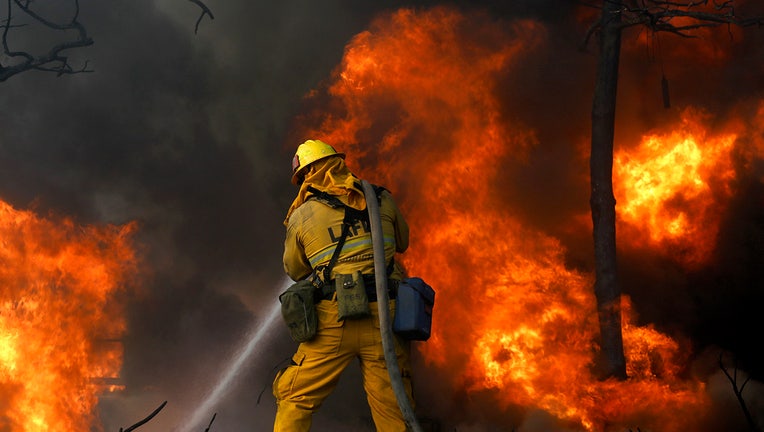Judge says synagogue can proceed with lawsuit over Skirball Fire damage

Firefighters try and save a home along Linda Flora Dr. in Bel Air, where the Skirball fire prompted a full closure of the 405 Freeway as well as mandatory evacuations on December 6, 2017. (Genaro Molina / Los Angeles Times via Getty Images)
LOS ANGELES - A Bel-Air synagogue and other parties can move forward with lawsuits alleging the city and county of Los Angeles failed to
clear the homeless encampment where the 2017 Skirball Fire started, a judge ruled on Tuesday.
Los Angeles Superior Court Judge Kenneth Freeman denied motions by the government entities dismiss the cases brought by the Leo Baeck Temple and the other plaintiffs.
"Defendants were, at all relevant times, aware of the homeless encampment and the existence of open-air fires on its property," Freeman wrote in his ruling. "Defendants had received multiple complaints about the encampment and had been to the location to observe the dangerous condition prior to the Skirball Fire."
The judge also allowed Ace American Insurance Co. and other insurers that paid money to clients for property damaged in the fire to proceed on their claims against the state of California for dangerous conditions on public property, but not on trespass and negligence allegations.
The synagogue leaders said their building sustained fire damage from the blaze, which swept through the hills of Bel-Air in December 2017 after a cooking fire broke out at an encampment nearby. The blaze destroyed six homes and damaged a dozen others.
The temple leaders allege the city received multiple complaints about the encampment, which was situated among dry brush and flammable vegetation, but failed to inspect or warn the public about the dangerous condition.
The city and county "knew or should have known that this presented a fire hazard, as the area is prone to wildfires because of the trees, bushes and other vegetation and foliage," the lawsuit states.
The encampment was nestled in a canyon several hundred feet from Sepulveda Boulevard and the San Diego (405) Freeway, hidden from passing cars. Officials have said it was home to an unknown number of people for several years.
The camp -- one of scores of makeshift communities that have grown along freeways, rivers and open space across Los Angeles -- was largely destroyed in the fire.

